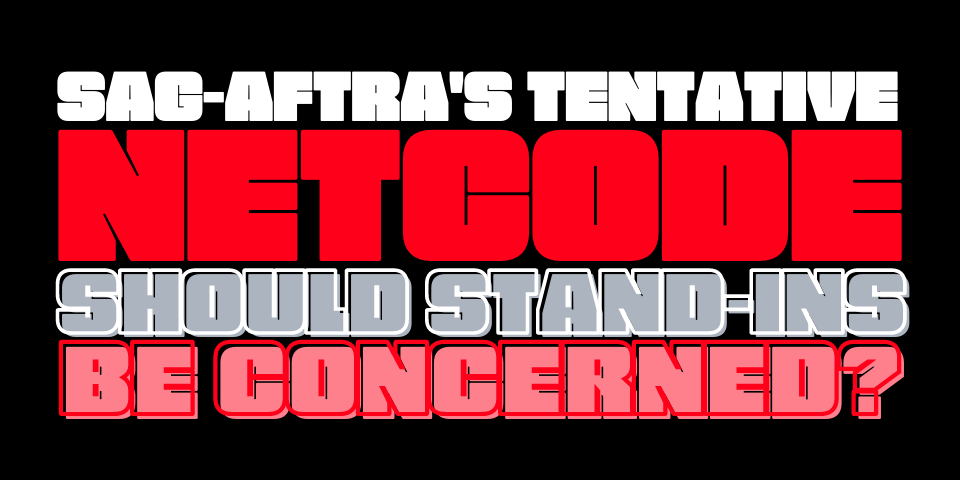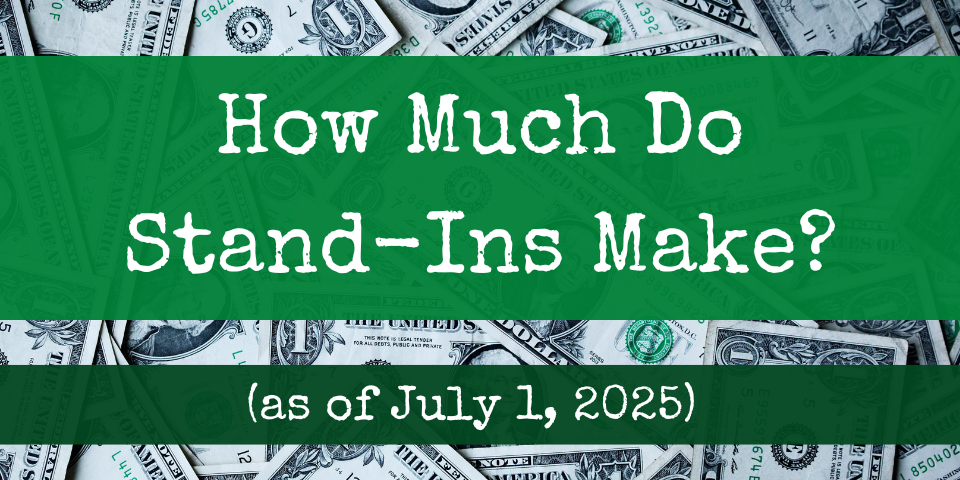Many stand-ins work under SAG-AFTRA’s Network Television Code (“Netcode”) (found here plus here). The Netcode is essentially an old AFTRA collective bargaining agreement that covers many shows that have live studio audiences (like game shows, award shows, variety shows, etc.), as well as promos, talk shows, and soap operas.
Although some employers under the Netcode may pay stand-ins a daily rate, many stand-ins hired under the Netcode are paid not a daily rate but instead an hourly rate. In fact, under the Netcode, some stand-ins have just a two-hour minimum.
At the current rate of $29/hour under the Netcode, stand-ins can report to a job, be wrapped two hours later, and have a gross paycheck of just $58.
The Pains SAG-AFTRA Has Inflicted on Netcode Stand-Ins
Aside from the potential for low take-home pay, what is especially painful about the Netcode is that many stand-ins working under it really do not know the terms of their work, even despite SAG-AFTRA negotiating for better rate disclosure last time it negotiated the Netcode. (From the Miscellaneous section of the 2018 Memorandum of Agreement: “Stand-Ins / Dance-Ins: Shall be advised of their minimum call at the time of engagement.”)
What is even more painful is that Netcode meetings with SAG-AFTRA members happened in spring 2021 in advance of the expiration of the Netcode on June 30, 2021. These meetings, called “Wages & Working Conditions” meetings, allowed members to share about their wages, working conditions, and other contract-related matters with SAG-AFTRA as part of its collective bargaining procedures. However, months in advance of its expiration, around April 18, 2021, SAG-AFTRA announced without explanation it agreed to extend the Netcode by four months (until about the end of October). This was the first time SAG-AFTRA agreed to a Netcode extension.
SAG-AFTRA Kept Agreeing to Extend the Effectively Expired Netcode
Upon its near expiry, on October 26th, 2021, SAG-AFTRA agreed to extend the Netcode again to January 21, 2022. This was the second time SAG-AFTRA agreed to a Netcode extension.
Again near its expiry, SAG-AFTRA agreed to extend the Netcode to March 18, 2022. This was the third time SAG-AFTRA agreed to a Netcode extension. When the Stand-In Central editor asked a SAG-AFTRA representative via email why SAG-AFTRA agreed to extend the Netcode again, the representative replied, “This decision was made in coordination with the negotiating committee, but beyond that, I am not able to share the reasoning behind ongoing negotiation strategy as that remains confidential.”
Come its expiry on March 18, 2022, the editor emailed a SAG-AFTRA representative on the Netcode’s status given it was expiring that day, and the representative replied via email, “While the parties remain working towards a deal, the negotiating committee has agreed to extend. The exact date of such extension is currently being finalized.” On March 31st, the SAG-AFTRA representative finally “heard back,” writing, “An agreement has been reached with the industry to extend the Network Code through May 5th.” This was the fourth time SAG-AFTRA agreed to a Netcode extension.
On May 5th, the editor again wrote the SAG-AFTRA representative on the status of the expiring Netcode. Eventually, on May 12th, the SAG-AFTRA representative replied, “An agreement has been reached with the industry to extend the Network Code on a day to day basis.” This was the fifth time SAG-AFTRA agreed to a Netcode extension. Arguably, SAG-AFTRA agreed to extend the Netcode multiple times after then, because this extension was a day-to-day extension.
On May 24th, 2022, SAG-AFTRA announced on its website it had reached a tentative successor agreement to the Netcode. It did not disclose its terms, and the tentative agreement was subject to “consideration” by the SAG-AFTRA National Board. SAG-AFTRA explained, “Additional details of the tentative agreement will be released following the Board vote at an upcoming meeting.”
In summary, the Netcode was set to expire on June 30th, 2021. SAG-AFTRA extended the Netcode five and arguably more times. SAG-AFTRA reached a tentative successor agreement on May 24th, 2022, about 327 days after the Netcode was set to expire.
In other words, for nearly an entire year, SAG-AFTRA members (including stand-ins) worked under effectively expired terms and conditions of employment, seeing no typical wage hike that comes with a successor agreement over that year.
Put differently, Netcode employers got SAG-AFTRA talent for old rates, effectively saving them money on them still to this day.
Also in summaru, SAG-AFTRA did not publicize explanations for these five-plus extensions, nor did it hold meetings with members who might be interested in negotiations over new terms and conditions — given how more than a year had passed since members had shared with SAG-AFTRA their opinions on wages and working conditions under the Netcode.
What’s Next
The effectively expired Netcode is still in place, with stand-ins still making $29/hour with two-hour minimums on some jobs and other problematic, depressed working conditions.
Assuming the National Board approves the tentative agreement, after then, SAG-AFTRA members will vote via referendum on whether or not to ratify the proposed Netcode successor agreement.
It is unclear as of publication time whether stand-ins or other SAG-AFTRA unit employees will receive retroactive payments should this proposed successor agreement go up for member ratification.
So, What Should You Look For?
In the event a proposed Netcode successor agreement goes up for member vote, and if you are able to vote on it, take some of these points into consideration:
- Look for any language about retroactive payments. Recall that SAG-AFTRA agreed to extend the Netcode five-plus times, effectively keeping an agreement in place that expired on June 30, 2021. So, if you are a stand-in, you likely have been denied wage increases and other improvements in terms and conditions of Netcode employment for nearly a year. That may mean a decent amount of money out of your pocket and remaining in producers’ pockets. So, if the proposed Netcode does not contain any language granting you retroactive pay increases for the near year of waiting for a successor agreement, then consider voting no to help reject the proposed Netcode and send SAG-AFTRA back to bargaining for retroactive wage increases.
- Look for language about stand-ins. Stand-In Central has long made it a cause to promote the depressed wage conditions of stand-ins under the Netcode, especially for those working under two-hour minimums. If SAG-AFTRA has not negotiated for assured daily rates for Netcode stand-ins or better take-home pay conditions for them, consider voting no on the proposed Netcode to send SAG-AFTRA back to bargaining better for stand-ins.
- SAG-AFTRA has a history of sending emails, mailing postcards, emailing USPS Informed Delivery business mailers, even robocalling members to vote yes on the tentative agreements its National Board has largely approved. Ratification only requires majority vote, so with a membership inclined to vote how SAG-AFTRA enthusiastically tells it to in its correspondence, ratification is nearly assured.
- Similarly, a majority of no votes shoots down ratification. If a majority rejects the proposed Netcode, SAG-AFTRA and the Netcode employers must hash out a new tentative agreement — which also must achieve majority member vote in order to be ratified.
- Effectively, SAG-AFTRA only needs to have one more yes vote than no votes in order to ratify a proposed agreement. So, if only 7 members vote no on a proposed agreement, SAG-AFTRA needs just 8 members to vote yes to ratify — and all the other yes votes are not important. So, the more no votes there are, the harder it is for SAG-AFTRA to get its proposed agreements ratified — even though most proposed agreements will still be ratified because there will be an abundance of yes votes. If you are one inclined not to vote at all, then vote no to help members who are hurt by SAG-AFTRA’s proposed agreements
- In general, no strike can happen unless SAG-AFTRA first wins a strike authorization vote from its members, and such authorization has to have a specific supermajority of members agreeing to authorize SAG-AFTRA to strike. As of publication date, SAG-AFTRA has not asked its members for strike authorization, so it would be highly unlikely a lawful strike would follow in the event members reject the proposed Netcode.
Of course, a proposed Netcode may be decent, good, even fantastic. Stand-In Central will try to weigh in on a proposed Netcode successor once it is available.
Sign up for email updates to learn what we think about the proposed Netcode!
What do you think about working as a stand-in under the Netcode? What did you learn about the Netcode from this post? Share your perspectives below!







Leave A Comment